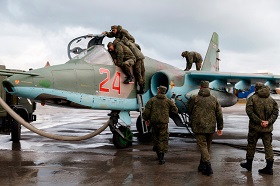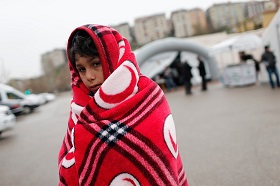Hordes of politicians and pundits in Russia and beyond were stunned by the surprise end of Moscow’s operation in Syria. In fact, the Kremlin has achieved its key military and political goals, and with negligible losses. Many wonder why the Russians preferred to leave instead of capitalizing further on their victories. There appear to be several reasons that could explain the haste.
Hordes of politicians and pundits in Russia and beyond were stunned by the surprise end of Moscow’s operation in Syria. In fact, the Kremlin has achieved its key military and political goals, and with negligible losses. Many wonder why the Russians preferred to leave instead of capitalizing further on their victories. There appear to be several reasons that could explain the haste.
A Military Victory
At first glance, the Syria operation does not appear to be successful. But in technical terms, it was without a doubt brilliant. The costs seem to have been quite modest, with President Vladimir Putin assessing them at 33 billion rubles, the RBK News Agency at 38 billion rubles, and the West at USD 4 billion a day, i.e. about USD 660 million over 22 weeks. Even the worst-case calculation puts the endeavor at slightly over one percent of Russia’s defense budget, while in a comparison with the U.S. operation Inherent Resolve, one day of the Russian operation with dozens of combat missions runs cheaper than two American ones. However, Russia appears to have failed to fully attain any of the three official military aims.
The Kremlin brought its troops to Syria to fight against the Islamic State (IS) and has seriously damaged its oil business. At the same time, Russia is withdrawing with the terrorists still functional. Moreover, some Western media insist that the IS has remained intact after most of the Russian air raids and has even gained ground since many of the strikes were targeted against the Syrian opposition. President Putin said that the operation was meant to exterminate the fighters in the IS ranks who came from Russia and the post-Soviet space, a task which also appears incomplete. At the operation’s launch, Mr. Putin insisted that IS was manned by five to seven thousand natives from Russia and other CIS countries, while upon its termination, Russian Defense Minister Sergey Shoigu reported only two thousand thugs of Russian origin had been killed. Finally, Mr. Putin made it clear that the operation would last until the Syrian troops finalized their offensive. But Russia is withdrawing its forces while the army of Bashar Assad is advancing on Palmira and Al Karyatan.
Does this all mean that the operation of the Russian Aerospace Forces is an achievement? Definitely, yes, because the real military goals somewhat differed from those stated by Mr. Putin. The idea was to solidify Mr. Assad’s regime, to consolidate the elites through military success, to drive the jihadist groups away from the Syrian heartland, and to expand Damascus-controlled territories. These missions were obviously accomplished to kick off an effective negotiating process between Mr. Assad and some of the opposition forces. The future of the Geneva talks is of course quite uncertain, but Moscow and Damascus have placed their stake on a separate dialogue with the combatants in Syria.
What Has Been Done
As far as political aspects are concerned, the operation was a success, which means more than rescuing Mr. Assad’s regime and preserving Syrian statehood. In fact, Moscow has significantly bolstered its regional and global position.
First, Russia has distracted the global community from Ukraine. In technical terms, the Ukraine conflict was not nearly scorching enough to damage the Kremlin’s image; since Mr. Putin entered into the Minsk Accords, he has abided the commitments and has been astonishingly good-natured toward Kiev. Some observers even believed that the power and food blockade of the Crimea, malicious actions by Ukrainian nationalists and attacks against the Russian Embassy would trigger much more toughness from the Kremlin that might take both economic and military-diplomatic steps. However, despite Moscow’s amicability, the West chose to build and maintain a media representation aimed to placing the blame for the failure of the Minsk process entirely on Russia, the bad guy by definition. By diverting the West’s attention towards the Syrian conflict, where Moscow was the good guy fighting against the absolute evil of IS, Mr. Putin has managed to partially destroy the appalling portrait of Russia painted by Western media.
Second, Moscow has not only substantiated its leadership claims but also clearly demonstrated the difference in the Russian and American approaches to convoluted international problems. Being no secret, Washington had no clear-cut policy in the Syria conflict, at least since the completion of the Tehran nuclear deal when the prospect of a peripheral war against Iran moved to the backburner. As a result, the United States virtually franchised Syria to its regional allies Turkey and Saudi Arabia whose views on Syria hardly coincide with U.S. national interests. No wonder, the U.S. positions in the Middle East have been shattered, as well as the allies’ faith in the American leadership. Even the habitually supportive liberal U.S. media have criticized Barack Obama for his inertia on the Syrian track. At the same time, Moscow has distinctly shown the resolve to act against international terrorism (according to Der Spiegel, Mr. Putin has occupied the niche rejected by the appalled West) and also the ability to do so towards its national interests but not “the optimistic dreams of a better world resting on a global consensus and absence of conflicts.” As a result, Moscow is definitely seen as a more predictable partner, with the criteria for other states to obtain its assistance lying only in matching national interests. In contrast to American demands, these seem quite reasonable and do not require complete obedience from the aid recipient, to say nothing of restructuring to a Russian model through democratization or liberalization. This point is especially meaningful for the Middle East countries that are in search of new patrons in view of the snowballing confrontation with Iran. Upon signing the deal with Tehran, sidestepping its allies and demonstrating the readiness to betray its friends, Washington can be hardly seen as a reliable partner.
Promoting One’s Interests
Still unanswered is the question of why the operation was stopped now. Why not wait several weeks and suspend it after a major victory, for example after seizing Palmira? We can offer several explanations for Russia’s alacrity, apart from an obvious supposition that the cause lies in the worsening weather conditions.
Scenario one is related to Turkey. The Kremlin might expect a Turkish intrusion in Syrian Kurdistan. And the reason is not the recent act of terrorism in Ankara that took dozens of victims and with responsibility taken by a Kurdish group, but rather in the declaration of Syrian Kurdish Autonomy, which occurred after Mr. Putin’s statement on the suspension of the Syria operation, although the Kurdish decision was forthcoming. According to some experts, the act is seen in Turkey as a direct threat to its security and territorial integrity. Ankara fears that Kurdish autonomy along Turkish borders would push their Kurds towards a quest for their own autonomy or even independence. The United States definitely opposes the Turkish invasion and is doing much to protect the Kurds. But Washington is openly working to set up an independent Kurdistan, so the Turks may feel cornered and project their forces, especially after Russia leaves Syria.
To this end, Moscow’s stance appears both highly cynical and appropriate. The Kremlin would be most happy to act on Mr. Putin’s hint and attack a Turkish expeditionary corps. But more preferable appears luring Ankara into the Syrian trap fraught at least with a military defeat and a major conflict with the U.S.A., and at a maximum – with a new Turkish president and a new regime that would be suitable for Russia to have the bilateral relationship restored.
The second scenario implies a Russian-American deal with Russian concessions on Syria swapped for U.S. concessions on Ukraine. The affair has been hanging in the air for a long time, so it could have easily been finalized during the past weeks. Anyway, the timing is quite understandable: Washington gained from the end of Moscow’s operation during the current round of the Geneva talks. The step has worked to place pressure on Damascus and make it more pliable vis-à-vis the opposition, for example on issues of federalization, i.e. the Geneva process aims resisted by Mr. Assad who regards them as a move toward the breakup of the country because the elements of statehood could be activated during any kind of a crisis. However, both Moscow and Washington realize that federalization offers the only compromise solution to the Syrian conundrum (both in view of the interests of Syrian groups and the external actors that will use the groups to wield their influence), as well as the only chance to preserve the country’s integrity.
Finally, withdrawal may offer a sort of a lesson for Iran. As of now, Russia is doing all the dirty work in Syria while Iran is failing to fulfill its commitments and is not building up its contingent. Hence, the Syrian forces are not able to wage a full-fledged war, dragging Moscow into a protracted conflict. Moreover, Tehran, whose interests Moscow is also defending in Syria, has been lately hardly acting like a partner, from the multibillion contracts with Western firms without taking into account Russian interests to an unwillingness to help Moscow in propping up oil prices. In a situation like this, it is hardly sensible for Moscow to bear both military and image-related damages, for example, being seen as a component of the Shiite bloc opposing the Sunni.
Of course, this down not mean that the Kremlin is on the side of the Sunnis, and that it has betrayed Iran to join the Saudis. The Kremlin is siding only with Russia, demonstrating to the Iranian partners its flexibility and readiness to cooperate with the countries that respect Russian interests and pay in kind.
Russia has minimized its role in the Syrian operation but is hardly out. With Russian air support, the Syrian forces keep advancing on IS and may soon seize Palmira. Russian weapons also keep arriving to Damascus, and the Russia-sponsored talks in Kheimim with local field commanders are also moving ahead. But for now Mr. Assad will have to be more flexible, and we may also expect a more active Iran and Hezbollah in the Syrian theater, since Tehran will have to defend its national interests. Hence, the Kremlin is still on the winning path in Syria but with substantially fewer losses and more political opportunities.






